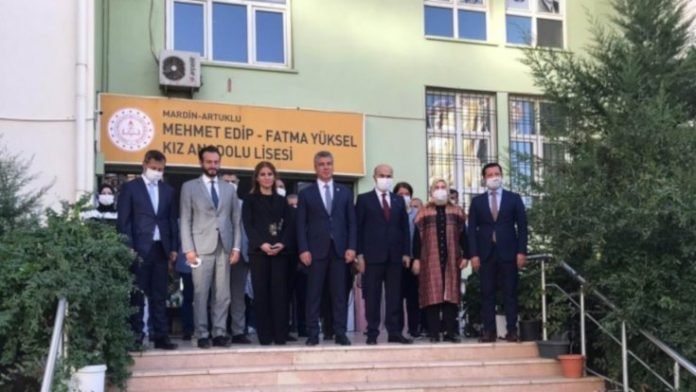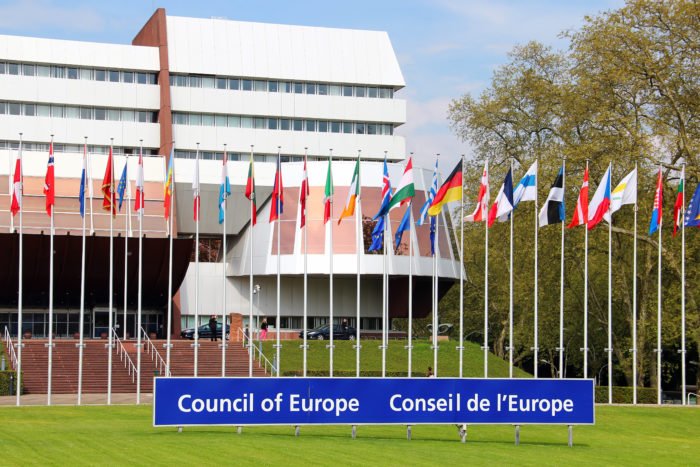President of the European Court of Human Rights (ECtHR) Róbert Ragnar Spanó drew further ire from human rights defenders and the Turkish opposition after posing with members of Turkey’s ruling Justice and Development Party (AKP) in the southeastern city of Mardin during a visit to Turkey last week.
The photo was shared on Twitter by the AKP women’s branch in Mardin but later deleted following a flurry of criticism. Spanó was also criticized for visiting the governor of Mardin, who is at the same time acting mayor of the city, whose elected mayor from the pro-Kurdish Peoples’ Democratic Party (HDP) was ousted on August 19, 2019 due to terrorism-related charges.
In a June press statement legal experts from the Council of Europe’s (CoE) Venice Commission had called on the Turkish government to repeal decisions that undermined democratic self-government in the country’s Southeast and to reinstate the mayors of Mardin, Diyarbakır and Van. The ECtHR is also affiliated with the CoE.
Following his meetings with Turkish government officials, including President Recep Tayyip Erdoğan and Justice Minister Abdülhamit Gül, Spanó also visited İstanbul and received an honorary degree from İstanbul University in a ceremony that was closed to the press. According to Turkish media, the request to close the event to journalists came from Spanó himself.
His decision to accept the degree had sparked criticism last week. Critics claimed that accepting an honorary degree from a public university that is effectively controlled by the Turkish government would conflict with the court’s stance and principles. According to a report by the US-based Advocates of Silenced Turkey, İstanbul University summarily fired 192 academics in the aftermath of a failed coup in July 2016.
I invite Mr. Spano, President of the ECtHR, who met the Turkish President and government officials, to visit Diyarbakır. @echr_cedh pic.twitter.com/VW8BNvaHRv
— Başak Demirtaş (@Basak__Demirtas) September 6, 2020
In a tweet on Sunday, Başak Demirtaş, spouse of jailed Kurdish leader Selahattin Demirtaş, invited Spanó to Diyarbakır. “I have no doubt that you have had a chance to learn the position of the government from the authorities you have met.” Demirtaş’s tweet read. “If you spend an hour with me, it will be enough to inform you about our position,” she said.
Spanó did not meet with Turkey’s human rights organizations or members of the opposition during his visit.
Selahattin Demirtaş was arrested on November 4, 2016 on terrorism-related charges and has been in jail since then. On November 20, 2018 the ECtHR ruled that Demirtaş’s lengthy pre-trial detention had violated the European Convention on Human Rights, ordering the Turkish government to pay 10,000 euros in compensation and calling for his release. The Strasbourg court described Demirtaş’s arrest as “politically motivated.”
Following the ECtHR ruling, a Turkish appeals court upheld a four-year, eight-month sentence and in effect nullified the ECtHR decision.
The European Court of Human Rights is an international court set up in 1959. It rules on individual or state applications alleging violations of the civil and political rights set out in the European Convention on Human Rights.
The court has received increasing criticism for not deliberating cases from Turkey that were submitted after the July 2016 coup attempt, following which the Turkish government declared a state of emergency and launched a massive crackdown under the pretext of an anti-coup fight. Over 540,000 people were detained on terrorism-related charges, more than 80,000 were arrested or imprisoned and over 150,000 public servants were summarily removed from their jobs for alleged membership to or relationship with “terrorist organizations.”
In a recent statement Filipe Marques, president of MEDEL, an NGO of judges and prosecutors’ associations throughout Europe, had said the ECtHR “should cease to consider the Turkish Constitutional Court as a source of effective remedy.” According to Marques the ECtHR must look at issuing interim measures as a matter of its own credibility.
Under the ECtHR’s regulations, domestic judicial remedies must first be exhausted before individuals can have recourse to the court. To avoid possible adverse rulings from the court, the Turkish government established a commission in January 2017 to evaluate the cases of people who were summarily fired from their public jobs during the state emergency, which was in effect for two years after the coup attempt.
The commission was accepted as an effective remedy, and applicants cannot apply to the ECtHR before the commission rules on their cases. There are still cases pending before the commission more than three-and-a-half years after its establishment. Moreover, after the commission’s decision the applicants first need to go through Turkey’s administrative court system and ultimately the Constitutional Court before their cases are eligible to be heard by the ECtHR.
















